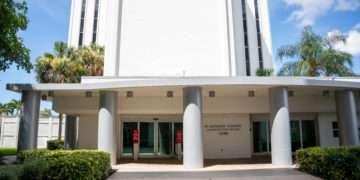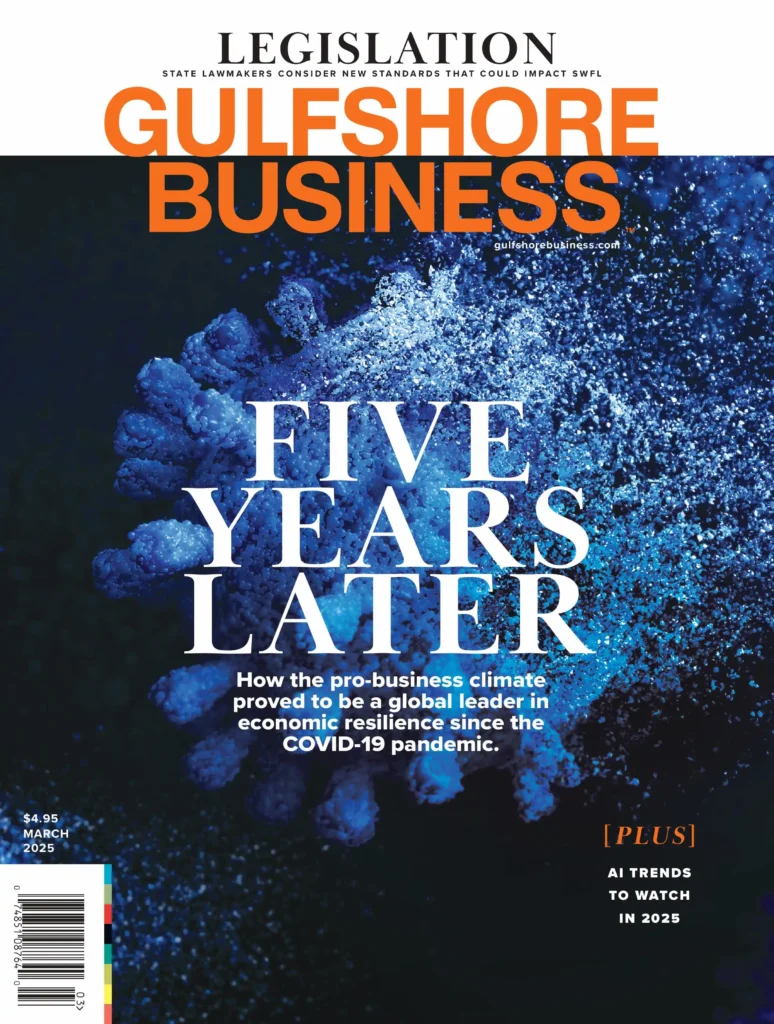The developer of Fiddler’s Creek in East Naples was granted county approval to move forward with a plan to add 750 apartments, including affordable workforce housing — a project that still faces state and federal hurdles.
Collier Board of County Commissioners on Dec. 10 unanimously agreed to amend the county growth management plan to remove land-use restrictions to allow Naples-based Gulf Bay Group of Cos. to build a four-story, 69-foot high apartment complex on 49.9 acres set aside for recreational use. They also unanimously agreed to amend the Marco Shores/Fiddler’s Creek Planned Unit Development to increase the allowable number of homes from 6,000 to 6,750.
The land-use amendment must be approved by the Florida Department of Commerce, and the developer still must go through other state and federal approvals.
Although the majority of speakers urged denial, Naples Comprehensive Health and the Greater Naples Chamber cited the need for affordable workforce housing.
“The demand is there. People are wanting the housing,” Commission Chair Chris Hall said, seconding Commissioner Rick LoCastro’s motion to approve.
 The vote went against a unanimous vote by the Planning Commission’s to deny the petition due to environmental, traffic and stormwater concerns. Hall changed the commission’s usual procedure and denied residents the ability to cede three minutes to other speakers, didn’t allow their experts to speak and barred Audubon Western Everglades’ representative from speaking more than three minutes. That gave the petitioner’s side five hours versus about an hour for residents and their attorney. It was Hall’s last meeting as board chair.
The vote went against a unanimous vote by the Planning Commission’s to deny the petition due to environmental, traffic and stormwater concerns. Hall changed the commission’s usual procedure and denied residents the ability to cede three minutes to other speakers, didn’t allow their experts to speak and barred Audubon Western Everglades’ representative from speaking more than three minutes. That gave the petitioner’s side five hours versus about an hour for residents and their attorney. It was Hall’s last meeting as board chair.
“I overestimated the commissioners and did not recognize until it was too late that the commissioners, staff, county attorney and the developers all work together hand-in-hand,” Stuart-based attorney, Gary Oldehoff, who has worked for three counties and residents on the winning side of similar land-use battles, said after the vote, adding that he’s planning their next steps.
As the nearly daylong hearing began, LoCastro, whose district covers the development near Marco Island, noted the decision would set a precedent for future construction projects countywide. He said emails commissioners received show there’s confusion about the process, environmental and traffic concerns.
“We aren’t looking to arbitrarily allow construction on every undeveloped parcel of land, but landowners also have rights when they pay for a piece of property to be able to do something with it,” LoCastro told residents, who packed commission chambers and listened online. “… We are voting on allowing a parcel of land currently zoned for a park, a golf course, boat storage and a multitude of other things, to possibly be rezoned so the landowner can then pursue the extremely complicated steps before any shovels would ever go in the ground.”
 “Many of those steps have huge hurdles, which could easily stop any project,” he added. “Our main decision is to determine if a rezone should be approved to allow the landowner the opportunity to explore all of the needed future steps to pursue possible construction.”
“Many of those steps have huge hurdles, which could easily stop any project,” he added. “Our main decision is to determine if a rezone should be approved to allow the landowner the opportunity to explore all of the needed future steps to pursue possible construction.”
He called the Planning Commission’s three days of hearings a “dry run” critical for the process, but contended “the five of us have much more depth on not only the issues, but especially the law as to what is feasible and what is not.”
That prompted Vice Chair Burt Saunders to emphasize that the Planning Commission process is critical and county commissioners value that input.
The parcel is part of the undeveloped 600-acre Section 29, which includes conservation land, while the 49.9 acres — currently a pasture — was set aside for recreational uses. Residents, who didn’t want their views of water and trees obstructed, say Realtors assured them it would never be developed.
They’d gathered evidence, hired an attorney and experts, set up a GoFundMe page, read thousands of pages of transcripts and records — and discovered the developer never filed a required conservation easement after a 1998 county commission hearing that allowed more homes in exchange for that easement. Getting the Army Corps of Engineers to force the developer to file that easement in 2022 was key to the residents’ case, along with obtaining an email from the U.S. Fish & Wildlife Service that countered Gulf Bay’s claims that they could delay filing the easement.
Land-use attorney Rich Yovanovich, who represented Gulf Bay Group, told commissioners they always intended to develop the land and weren’t hiding anything. He acknowledged they must amend an Army Corps of Engineers permit to move forward.
Gulf Bay has committed 30% of the apartments for affordable housing, half at the 100% and below area median income and half at 80% and below AMI. If all 750 units are built, Yovanovich said, there would be 225 income-restricted units, “probably the highest private sector proposed affordable housing commitment in Collier County.”
 He contended the Planning Commission unfairly focused on Planning & Zoning Director Mike Bosi’s testimony that planning staff wouldn’t have approved the project if it didn’t include affordable housing.
He contended the Planning Commission unfairly focused on Planning & Zoning Director Mike Bosi’s testimony that planning staff wouldn’t have approved the project if it didn’t include affordable housing.
During the county commission hearing, Bosi detailed his stance, telling commissioners the project has many benefits, including affordable housing, and the apartments are within a 10-minute drive from a “tremendous number of employers” within 10 miles. He also said the developer agreed to create a larger buffer of lush trees between the new apartments and residents to the north, who will be 531 feet away, and will add drainage and road improvements.
Gulf Bay will spend about $7.8 million on improvements to Auto Ranch Road, which often floods. Among them are extending public utilities, raising and widening, adding a sidewalk and replacing drainage culverts. Gulf Bay agreed to coordinate with Collier Area Transit and the Florida Department of Transportation to add a bus stop at the intersection with U.S. 41 East.
John Erario and his wife Sue Caglioti, who set up the residents’ Go Fund Me page, urged commissioners to deny the project, citing a letter he received in January from the federal government that agreed the land was to remain a conservation area and the Army Corps permit can’t be changed.
“It’s impossible to misconstrue the finality of this letter,” Erario said, noting it refutes representations made by commissioners and others who said Section 29 is no longer environmentally important.
The land is near a 7,271-acre Collier-Seminole State Park, one of the world’s largest mangrove swamps, and a 1,300-acre Rookery Bay Reserve, a mangrove estuary that protects wildlife, coastland and water. As a result, Audubon Western Everglades Policy Director Brad Cornell urged commissioners to deny the rezoning, pointing out eight acres being developed for road improvements also is part of a preserve.
Cornell, who was surprised Audubon wasn’t allowed more than three minutes to speak, said the county’s procedural memo gives groups of five or more 15 minutes.
“The Fiddler’s Creek vote was a big disappointment and showed the desperation in the county to find affordable housing even at the expense of promises not to develop housing in Section 29 and harm panthers, Florida bonneted bats and American crocodiles — and put people unwisely in the Coastal High-Hazard Zone,” Cornell said after the vote. “I think they have a long way to go to get state and federal permits to do this unwise project.”





